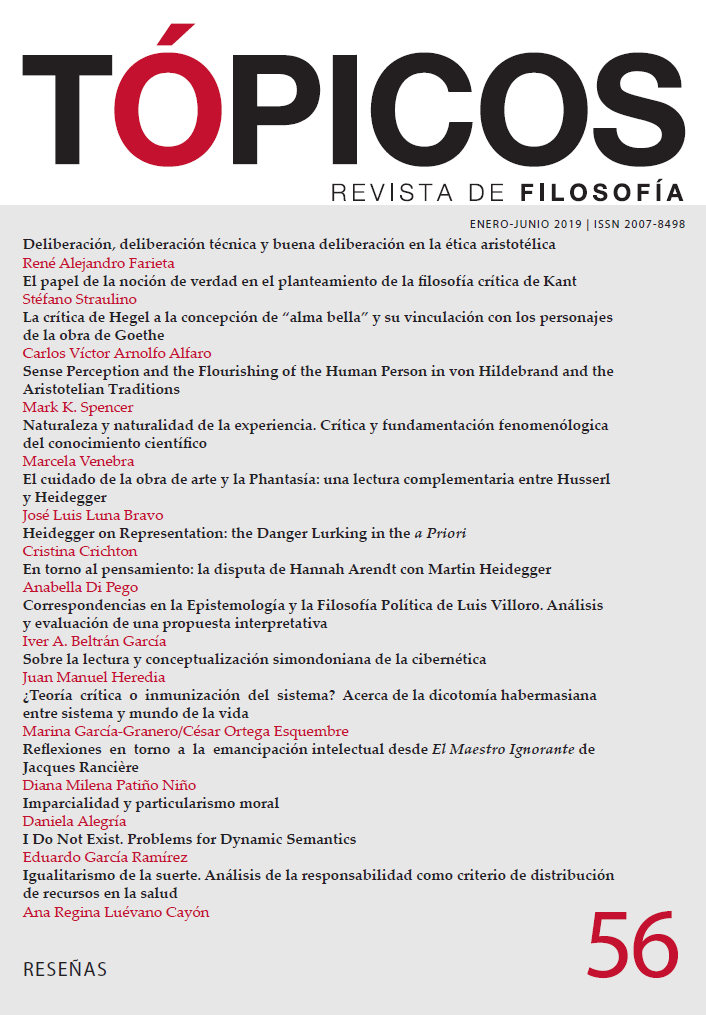Publicado 2018-12-13
Palabras clave
- Habermas,
- Teoría Crítica,
- sistema,
- mundo de la vida,
- racionalización.
Cómo citar
Resumen
El artículo presenta las fuentes y la definición de los conceptos sistema y mundo de la vida, poniendo de relieve cómo la colonización del mundo de la vida por parte del sistema aparece como un proceso patológico, frente al cual cabe mantener un posicionamiento crítico. Ante el aumento de la complejidad sistémica, es necesario asegurar la reproducción simbólica del mundo de la vida a través de la acción comunicativa. Compartiendo con Habermas el sentido de sus problematizaciones, presentamos sin embargo diversas objeciones a la oposición dicotómica de ambas esferas, en la medida en que ésta confiere a los sistemas económico y administrativo un estatuto ontológico que acaba blindándolos ante toda posible crítica.
Referencias
- Adorno, Th. W. & Horkheimer, M. (1998). Dialéctica de la Ilustración: fragmentos filosóficos. Madrid: Trotta.
- Baxter, H. (2011). Habermas: The Discourse Theory of Law and Democracy. Stanford, CA: Stanford Law Books.
- Beltrán Villalva, M. (2013). La hermenéutica del sentido de las “cosas sociales”. Arbor, 189, 761, a034.
- Benhabib, S. (1992). Models of public space: Hannah Arendt, the liberal tradition and Jürgen Habermas. En Calhoun, C. (ed.) Habermas and the public sphere. (73-98). Cambridge, MA: The MIT Press.
- Berger, P. y Luckmann, Th. (1983). La construcción social de la realidad. Buenos Aires: Amorrortu.
- Conill, J. (1991). El enigma del animal fantástico. Madrid: Taurus.
- ----(2001). Mundo de la vida y cultura moderna. En Investigaciones fenomenológicas: Anuario de la Sociedad Española de Fenomenología, 3, 67-80.
- ----(2013). Horizontes de economía ética: Aristóteles, Adam Smith, Amartya Sen. Madrid: Tecnos.
- Cortina, A. (2008). La escuela de Fráncfort: crítica y utopía. Madrid: Síntesis.
- ----(2009). La política deliberativa de Jürgen Habermas: virtualidades y límites. En Revista de Estudios Políticos, 144, 169-193.
- ----(2015). Razón instrumental, razón moral. En Eidón, 43, 4-15.
- Edwards, G. (2008). The Lifeworld as a resource for social movement participation and the consequences of its colonization. En Sociology, 42, 2, 299-316.
- Fascioli Álvarez, A. C. (2016). La crítica de Axel Honneth a la dicotomía habermasiana entre sistema y mundo de la vida. Recerca, Revista de Pensament i Anàlisi, 19, 73-92.
- Fraser, N. (1992). Rethinking the public sphere: a contribution to the critique of actually existing democracy. En Calhoun, C. (ed.). Habermas and the public sphere. (109-142). Cambridge, MA: The MIT Press.
- García-Marzá, D. (1996). Un modelo deliberativo de democracia participativa. En Arbor. Ciencia, Pensamiento y Cultura, 154, 608, 97- 121.
- ----(2013). Democracia de doble vía: el no-lugar de la empresa en la sociedad civil. En Revista del CLAD Reforma y Democracia, 57, 67-92.
- ----(2015). El valor democrático de la sociedad civil: una respuesta a la desafección. En Thémata. Revista de filosofía, 32, 93-109.
- Gil Martín, F. J. (2006). Racionalización de la esfera pública. El contenido normativo de la razón en la obra de Jürgen Habermas. En Tópicos, 30, 9-54.
- Gómez Ibáñez, V. (1995). “Mundo administrado” o “Colonización del mundo de la vida”. La depotenciación de la Teoría Crítica de la sociedad en J. Habermas. En Daimon. Revista internacional de filosofía, 10, 103-113.
- Habermas, J. (1981): Theorie des kommunikativen Handelns, vol. I y II. Frankfurt am Main: Suhrkamp. [Traducción española de Manuel Jiménez Redondo: Teoría de la acción comunicativa. Madrid: Trotta, 2010].
- ----(1982). Conocimiento e interés. Madrid: Taurus.
- ----(1986). Ciencia y técnica como “ideología”. Madrid: Taurus.
- ----(1989). El discurso filosófico de la modernidad. Madrid: Taurus.
- ----(1990). El pensamiento posmetafísico. Madrid: Taurus.
- ----(2000). Aclaraciones a la ética del discurso. Madrid: Trotta.
- ----(2001). Israel o Atenas. Ensayos sobre religión, teología y racionalidad. Madrid: Trotta.
- ----(2008). Conciencia moral y acción comunicativa. Madrid: Trotta.
- ----(2010). Facticidad y validez. Madrid: Trotta.
- ----(2015). Mundo de la vida, política y religión. Madrid: Trotta.
- Honneth, A. (1997). La lucha por el reconocimiento. Barcelona: Crítica.
- ----(2009). Crítica del poder. Madrid: Antonio Machado Libros.
- ----(2015). Die Idee des Sozialismus. Berlin: Suhrkamp.
- Horkheimer, M. (2010). Crítica de la razón instrumental. Madrid: Trotta.
- Husserl, E. (1991). La crisis de las ciencias europeas y la fenomenología transcendental. Barcelona: Crítica.
- Ion, C. G. (2015). Husserl, Habermas, and the lifeworld as the overall horizon within which individuals act. En Linguistic and Philosophical Investigations, 14, 115-120.
- Joas, H. (1986). Die unglückliche Ehe von Hermeneutik und Funktionalismus. Über Jürgen Habermas‘ Theorie des kommukativen Handelns. En Honneth, A. y Joas, H. (eds) Kommunikativen Handeln. (144-176). Frankfurt am Main: Suhrkamp.
- McIntosh, D. (1994). Language, Self and Lifeworld in Habermas’s “Theory of Communicative Action”. En Theory and Society, 23, 1, 1-33.
- Moreno Lax, A. (2008). Jürgen Habermas: entre la ética del discurso y la ética de la especie. En Tópicos, 35, 93-112.
- Neves, M. (2009). System und Lebenswelt. En Kreide, R., y Lafont, C. (eds.) Habermas-Handbuch (374-377). Stuttgart: Metzler.
- Romero Cuevas, J. M. (2011). Entre hermenéutica y teoría de sistemas. Una discusión epistemológico-política con la teoría social de J. Habermas. En Isegoría. Revista de Filosofía Moral y Política, 44, 139-159.
- Weber, M. (1987). Ensayos sobre sociología de la religión. Madrid: Taurus.
- ----(2012). El político y el científico. Madrid: Alianza.
- Wirts, A.M. (2014). A defense of the lifeworld: The source of normativity in a democracy. En Philosophy and Social Criticism, 40, 2, 215-223.







